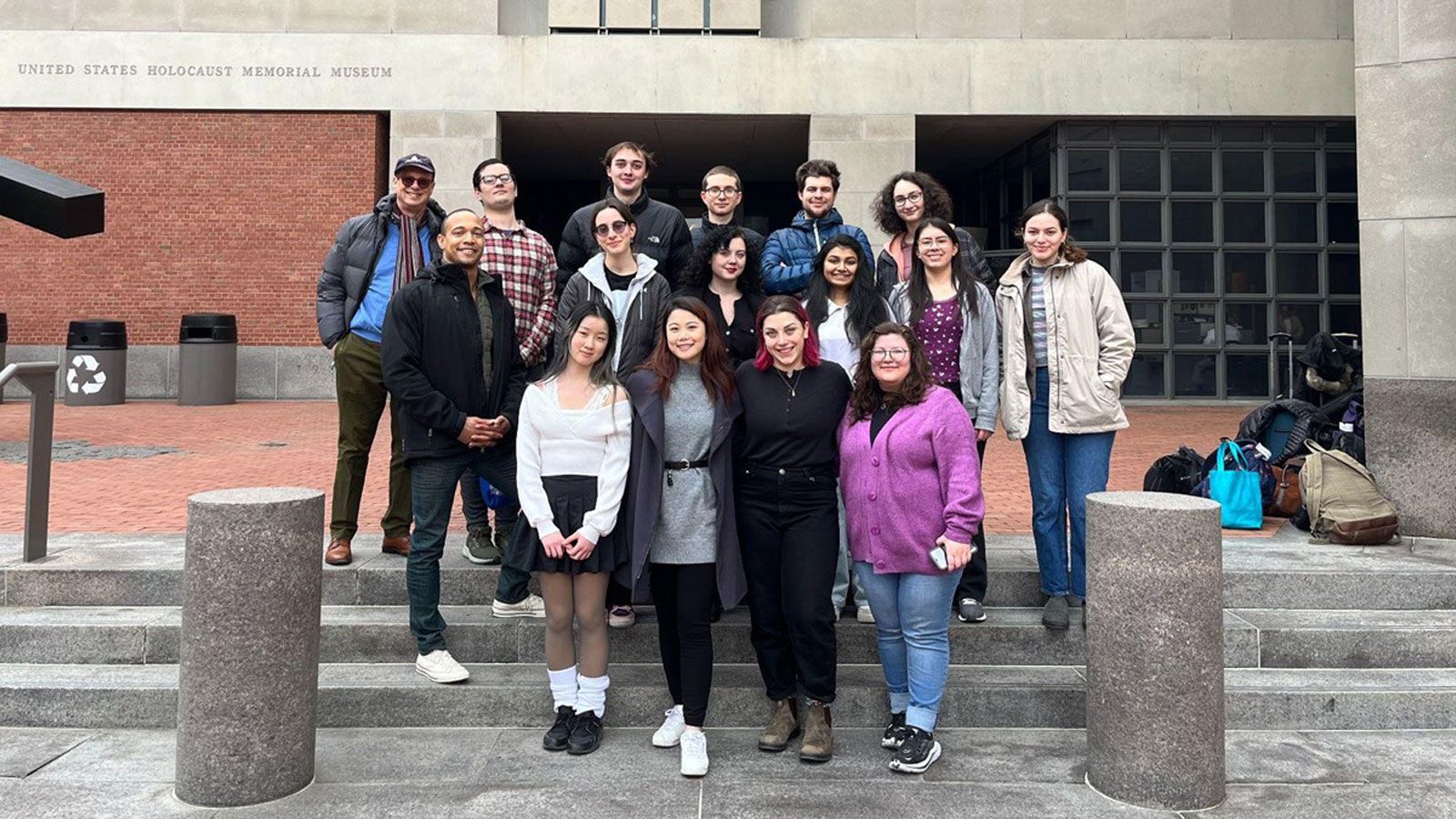In response to the recent upsurge in antisemitism, a group of 14 Hunter College students visited the U.S. Holocaust Memorial Museum in Washington, D.C., over Presidents Day Weekend in order to learn about the history of hatred and develop insights into ways to combat it.
The group went as part of the Eva Brust Cooper Fellowship Program, a project of Hunters’ Jewish Studies Center and its director, Leah Garrett, which aims to create a cadre of student ambassadors who can respond to antisemitism on campus and in their personal lives.
Guided by Hunter Jewish Studies Prof. Bruce Ruben, Hunter Hillel Rabbi Jonah Geffen, and Rosalyn Unger Director of Campus Outreach Leah Wolfson, the group toured exhibits on the rise of Nazism and the “Final Solution” and walked through a cattle car that carried thousands of Jews to death camps.
Along the way, they discussed topics such as racial antisemitism, Jewish responses to persecution, America’s role in World War II, and recent genocides, such as the 2017 massacre in Burma of the Rohingya people. They also visited the U.S. Capitol, and bonded during meals at local restaurants.
The Cooper Fellowship program, which is in its second year, is funded by the New York City Council and by Hungarian-born Holocaust survivor Eva Brust Cooper HCHS ’52 HC ’56 MA ’58, a major donor to Hunter’s Jewish Studies Center who recorded testimony about her childhood escape from the Nazis for the museum.
During the program, the fellows, who represent a variety of faiths and majors, attended four seminars on the history of antisemitism and learned methods to counteract the hatred. Rabbi Geffen discussed practical ways to speak up against bigotry and to help someone being targeted, while Professor Ruben taught the long history of antisemitism. The students also discussed the different reasons why people choose to help some and not others. At the conclusion of the program, the students will meet Eva Brust Cooper.
The students said they felt motivated to speak out after their trip.
“I wanted to share my experience about visiting the Holocaust museum, as I felt profoundly impacted by it,” said Greta Ghita, a fourth-year Biology major from Queens. “The focus on giving faces and stories to the victims brought a new and deeper understanding to the atrocities of this event; in particular, seeing an interview with one woman who survived a concentration camp as a child and being able to connect what we had discussed in the seminars with the devastating events of history made me feel extremely grateful for the chance to speak up against antisemitism and all forms of hate.”
Nicole Hilarion, a third-year Psychology major from Queens, felt discomfited by what she saw.
“Walking through the exhibits in the Holocaust Memorial Museum, I needed to take a moment by myself to fully process what was in front of me,” she said. “I learned so much and I feel that I can understand the scale of the Holocaust.”
Sophia Pisarevskiy, a sophomore from Brooklyn majoring in Biology and Clinical Psychology, said that the exhibits gave her a broader understanding of the different marginalized groups that were targeted by the Nazis.
“No matter how much you may have read about the Holocaust or are familiar with it, the museum will always provide new insight into the horror of the Holocaust and the slogan ‘Never Again.’”
The program is extremely popular among students; more than 50 applied for the 14 spaces in this year’s fellowship cohort.
According to Garrett, spending time at the museum taught the students about the seemingly unbelievable ways that hatred can take over a society — and how they can fight back against it.
“They gained a visceral understanding of the bigotry, violence, and death that six million Jews and countless others faced during the Holocaust,” she said. “With hope, this knowledge will help them to identify and face down the antisemitism and hatred they see in their own lives.”


